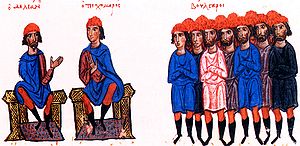- Tihomir (Bulgarian noble)
-
For other uses, see Tihomir
Tihomir (Bulgarian: Тихомир) was a 11th century Bulgarian military commander of Dyrrhachium, who had been sent to tackle an uprising in the north, against the Bulgarian Peter II Delyan, but he refused and instead joined him in the revolts. He later came into conflict with Delyan, because of his support as an Emperor himself.
Contents
Background
In 1040, Peter II Delyan revolted against Byzantine rule in the Theme of Bulgaria.[1] The Uprising first broke out in Belgrade where Delyan was proclaimed Emperor. He went south, going through Rascia and Dendra, then taking the Byzantine kastra of Naissus and Skopia.[1]
strategos Basil Synadenus of Dyrrhachium, had raised an army from the surrounding lands and marched out to confront the rebels, however, the Byzantine position was undermined by one of Basil's subordinates, Michael Dermocaites.[1] Dermocaites complained falsely to the Emperor of Basil's disorderly behaviour, who then put Basil in prison.[1] Dermocaites took over the troops, but quickly lost support. Instead they chose one of their own, Tihomir.
The revolt
The troops of Tihomir were to be sent towards the north, Belgrade and Margum, where they would attack Delyan. Tihomir instead joined Delyan.[1]
Tihomir was also proclaimed Emperor in his own right separate from Delyan. Delyan knew that the existence of two separate rebel leaders and camps would be problematic for the revolt and invited Tihomir to a meeting. During this meeting a debate was held between Delyan and Tihomir, and Delyan made the most convincing speech, stating that an army with two leaders will inevitably fail in their common goal. He stated that the Bulgarians should chose only one leader and that since he was the son of Gavril Radomir and descendent of the heroic Emperor Samuil, they should proclaim him as sole leader and emperor. As a result of losing this debate, Tihomir was eliminated as leader and killed.
See also
- Uprising of Peter Delyan
References
Categories:- 1040 deaths
- 11th-century Bulgarian people
- Bulgarian nobility
- Bulgarian people of the Byzantine–Bulgarian Wars
- Medieval Bulgarian military personnel
- History of Durrës
Wikimedia Foundation. 2010.

